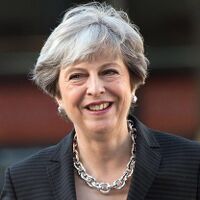Theresa May
Relevance
Mentioned In
- Inside the head of... Morrissey - Daily Mail (May 20, 2017)
- There Is A Light That Must Be Switched On - Morrissey Central (April 16, 2018)
- I’ve Been Dreaming Of A Time When / the English / are sick to death of Labour and Tories - Morrissey Central (April 20, 2018)
- EXCLUSIVE: Morrissey - Music-News.com (May 27, 2019)
Wikipedia Information
 |
Theresa Mary May, Baroness May of Maidenhead, (; née Brasier; born 1 October 1956), is a British politician who served as Prime Minister of the United Kingdom and Leader of the Conservative Party from 2016 to 2019. She previously served as Home Secretary from 2010 to 2016. She was Member of Parliament (MP) for Maidenhead from 1997 to 2024, and has been a member of the House of Lords since August 2024. May is the second female Prime Minister, after Margaret Thatcher, and the first woman to have held two of the Great Offices of State. Ideologically, May is a one-nation conservative. May grew up in Oxfordshire and attended St Hugh's College, Oxford. After graduating in 1977, she worked at the Bank of England and the Association for Payment Clearing Services. She also served as a councillor on Merton London Borough Council. After two unsuccessful attempts to be elected to the House of Commons, she was elected MP for Maidenhead at the 1997 general election. From 1999 to 2010, May held several roles in shadow cabinets and was Chair of the Conservative Party from 2002 to 2003. Following the formation of the coalition government after the 2010 general election, May was appointed Home Secretary and Minister for Women and Equalities, giving up the latter role in 2012. Re-appointed Home Secretary after the Conservatives won the 2015 general election, she became the longest-serving Home Secretary in more than 60 years. During her tenure as Home Secretary, she pursued reform of the Police Federation, implemented a harder line on drugs policy and further restricted immigration. She oversaw the introduction of elected Police and Crime Commissioners, the deportation of Abu Qatada and the creation of the College of Policing and the National Crime Agency. Although she supported the remain campaign, May supported Brexit following the victory of the leave campaign at the 2016 referendum. Also after the referendum, she was elected Prime Minister unopposed, succeeding David Cameron. As Prime Minister, May began the process of withdrawing the UK from the EU, triggering Article 50 in March 2017. In April, she announced a snap general election, with the aim of strengthening her hand in Brexit negotiations and highlighting her "strong and stable" leadership. This resulted in a hung parliament with the number of Conservative seats reduced to 317 from 330, despite the highest vote share since 1983 and the largest increase in electoral support enjoyed by a governing party since 1832. The loss of an overall majority prompted her to enter a confidence-and-supply arrangement with the Democratic Unionist Party (DUP). Following the 2017 election, May's premiership continued to be dominated by Brexit, in particular by her government's negotiations with the EU, adhering to the Chequers plan, which led to a draft Brexit withdrawal agreement. Other events that occurred during May's premiership were terrorist attacks in Westminster, Manchester Arena and London Bridge, the Grenfell Tower fire and Windrush scandal. Her government announced the NHS Long Term Plan and was responsible for negotiating and approving the near-entirety of the UK's terms of exit from the EU. May was also a prominent figure in leading the international condemnation and response to Russia over the poisoning of Sergei and Yulia Skripal in March 2018. May survived two votes of no confidence in December 2018 and in January 2019, but after versions of her draft withdrawal agreement were rejected by Parliament three times and her party's poor performance in the 2019 European Parliament election, she left office in July and was succeeded by Boris Johnson, her former foreign secretary. May remained in the House of Commons as a backbencher until she stood down at the 2024 general election. She was elevated to the House of Lords later that year as Baroness May of Maidenhead. In historical rankings of prime ministers, academics and journalists have ranked May in the bottom fourth quartile.
